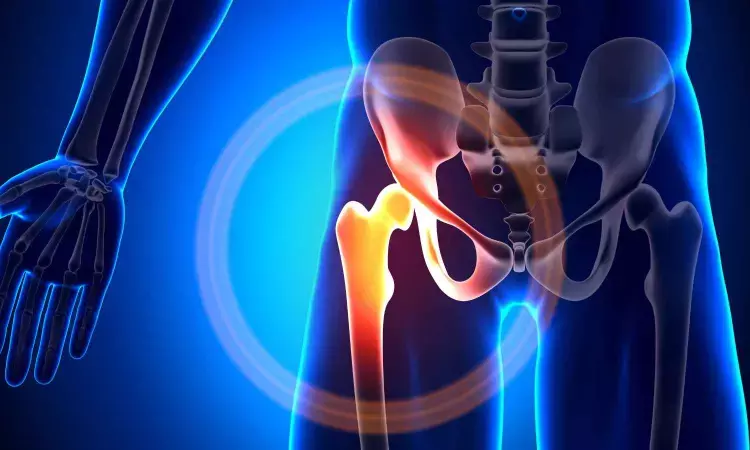- Home
- Medical news & Guidelines
- Anesthesiology
- Cardiology and CTVS
- Critical Care
- Dentistry
- Dermatology
- Diabetes and Endocrinology
- ENT
- Gastroenterology
- Medicine
- Nephrology
- Neurology
- Obstretics-Gynaecology
- Oncology
- Ophthalmology
- Orthopaedics
- Pediatrics-Neonatology
- Psychiatry
- Pulmonology
- Radiology
- Surgery
- Urology
- Laboratory Medicine
- Diet
- Nursing
- Paramedical
- Physiotherapy
- Health news
- Fact Check
- Bone Health Fact Check
- Brain Health Fact Check
- Cancer Related Fact Check
- Child Care Fact Check
- Dental and oral health fact check
- Diabetes and metabolic health fact check
- Diet and Nutrition Fact Check
- Eye and ENT Care Fact Check
- Fitness fact check
- Gut health fact check
- Heart health fact check
- Kidney health fact check
- Medical education fact check
- Men's health fact check
- Respiratory fact check
- Skin and hair care fact check
- Vaccine and Immunization fact check
- Women's health fact check
- AYUSH
- State News
- Andaman and Nicobar Islands
- Andhra Pradesh
- Arunachal Pradesh
- Assam
- Bihar
- Chandigarh
- Chattisgarh
- Dadra and Nagar Haveli
- Daman and Diu
- Delhi
- Goa
- Gujarat
- Haryana
- Himachal Pradesh
- Jammu & Kashmir
- Jharkhand
- Karnataka
- Kerala
- Ladakh
- Lakshadweep
- Madhya Pradesh
- Maharashtra
- Manipur
- Meghalaya
- Mizoram
- Nagaland
- Odisha
- Puducherry
- Punjab
- Rajasthan
- Sikkim
- Tamil Nadu
- Telangana
- Tripura
- Uttar Pradesh
- Uttrakhand
- West Bengal
- Medical Education
- Industry
Liposomal bupivacaine fails to decrease pain after hip fracture surgery: Study

For older adults undergoing hemiarthroplasty for hip fracture, intraoperative use of liposomal bupivacaine does not improve pain scores or other relevant outcomes, compared to conventional bupivacaine, reports a study in The Journal of Bone & Joint Surgery. The journal is published in the Lippincott portfolio by Wolters Kluwer.
"[U]se of liposomal bupivacaine is not associated with substantially improved postoperative pain or function or with a shorter hospital course following hip hemiarthroplasty for a femoral neck fracture," according to the clinical trial report by Mitchell K. Ng, MD, and colleagues of Maimonides Medical Center, Brooklyn, New York.
Randomized trial of liposomal bupivacaine for hip fracture surgery
Liposomal bupivacaine is a long-acting local anesthetic developed for use in relieving postoperative pain, allowing drug release over up to 72 hours. Studies have shown that liposomal bupivacaine can reduce pain after various surgical procedures, including total knee or hip arthroplasty. Few studies have assessed its use following hip fracture surgery.
The new clinical trial enrolled 50 older adults undergoing hip hemiarthroplasty for isolated intracapsular femoral neck fractures. Patients were randomly assigned to intraoperative injection of either liposomal bupivacaine or standard bupivacaine hydrochloride. In both groups, a series of injections were made around the reconstructed joint toward the end of the procedure.
Pain scores, total opioid dose, and time to ambulate were assessed in blinded fashion. Time to hospital discharge, safety, and a range of secondary outcomes were evaluated as well.
The results showed no significant difference in pain scores with liposomal bupivacaine (2.3) versus standard bupivacaine (2.7), with scores remaining comparable throughout the first 48 hours postoperatively. The two groups also required similar total opioid doses (morphine milligram equivalents) for pain relief. Liposomal bupivacaine is marketed as an alternative to reduce the need for postoperative opioids.
'Worth questioning' liposomal bupivacaine in geriatric hip fracture
In both groups, time to ambulation was about one day and time to hospital discharge was about four days. Delirium and other postoperative adverse events were comparable as well.
The new study – the first randomized controlled trial of liposomal bupivacaine for hip fracture surgery in elderly patients – showed no significant difference in pain scores and other relevant outcomes, as compared with standard intraoperative bupivacaine administration.
The researchers point out some limitations of their study, including possible variations in injection technique. Dr. Ng notes: "Our study specifically focused on hip fractures, and does not contradict the growing body of evidence that liposomal bupivacaine is indeed beneficial to reduce pain scores in context of primary total joint arthroplasty."
Citing a previous report, the authors note the high cost of liposomal bupivacaine: 11 times higher than standard bupivacaine or other postoperative pain modalities. "Given the increased costs associated with liposomal bupivacaine, it is worth questioning its use in the setting of geriatric patients with a hip fracture undergoing hemiarthroplasty," Dr. Ng and coauthors conclude.
Reference:
Kang, Kevin K. MD1; Voyvodic, Lucas BS1; Komlos, Daniel MD1; Swiggett, Samuel MD1; Ng, Mitchell K. MD1,a. Liposomal Bupivacaine Does Not Decrease Postoperative Pain in Patients with Intracapsular Femoral Neck Fracture Treated with Hemiarthroplasty: HEAT-A Randomized, Controlled Trial. The Journal of Bone and Joint Surgery ():10.2106/JBJS.23.01344, September 18, 2024. | DOI: 10.2106/JBJS.23.01344.
Dr Kamal Kant Kohli-MBBS, DTCD- a chest specialist with more than 30 years of practice and a flair for writing clinical articles, Dr Kamal Kant Kohli joined Medical Dialogues as a Chief Editor of Medical News. Besides writing articles, as an editor, he proofreads and verifies all the medical content published on Medical Dialogues including those coming from journals, studies,medical conferences,guidelines etc. Email: drkohli@medicaldialogues.in. Contact no. 011-43720751


